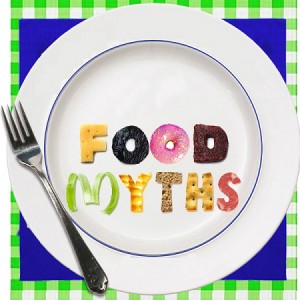7 Common Food Myths
- Myth #1 – Calories Don’t Count
Truth: Calories definitely do count. An excessive amount of even the most nutritious of foods, if it is above and beyond your caloric requirements, will cause you gain weight.
- Myth #2 – Skipping Meals Helps Weight Loss
Truth: Skipping meals is detrimental to weight loss. When you skip meals frequently, your body goes into a fasting mode and your metabolic rate, the rate at which your body burns calories, slows down. Meal skippers are also more likely to overeat at their next meal.
- Myth #3 – Fast Food is Junk Food
Truth: There are healthier fast food items. Most fast food restaurants, as well as many other food establishments today, provide their customers with nutrition data about the products they serve. Use this information to help you stick to your eating plan.
- Myth #4 – Cholesterol Free = Heart Healthy
Truth: Cholesterol-free products might contain unhealthy levels of fat. Saturated and trans fats raise the level of LDL (“bad” bad cholesterol) in the body. Trans fat also lowers the level of HDL (“good” cholesterol). High LDL and low HDL are risk factors for a heart attack.
- Myth #5 – Margarine is Better Than Butter
Truth: Margarine does not beat butter if it contains partially hydrogenated vegetable oils. That means the margarine contains trans fats, and trans fats should be avoided. Look for heart-healthy margarine that is free of partially hydrogenated oils.
- Myth #6 – If You Take a Vitamin/Mineral Supplement, it doesn’t Matter What You Eat, You Will Get All Your Needed Nutrients
Truth: It isn’t possible to get all your body needs from a vitamin/mineral pill. Nutrition research consistently shows that foods with specific vitamins, minerals and phytochemicals give health benefits, not supplementation alone. Supplements are called that because they are intended to supplement foods, not replace them.
- Myth #7 – Low-Fat, Fat-Free or Sugar-Free = 0 Calories
Truth: Products advertised as low-fat, fat-free or sugar-free probably still have calories. READ LABELS. Sometimes you’ll find that low-fat alternatives have more calories than the original product.
Category: Nutrition

